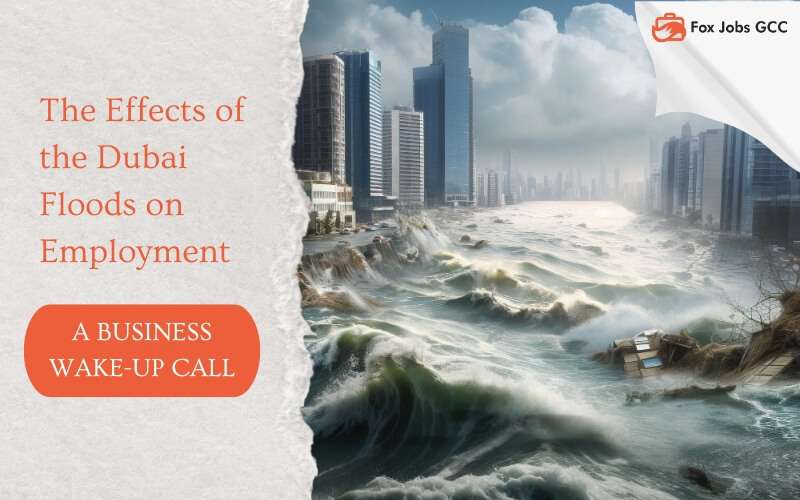The Effects of the Dubai Floods on Employment: A Business Wake-Up Call
The recent floods in Dubai, United Arab Emirates, have highlighted how businesses are vulnerable to extreme weather disasters. Great deal of flooding and disruption to the transportation system occurred due to the city’s severe downpour, leaving many workers stranded on flooded roads or unable to get to their places of work.
The experiences of people like Arvind, who had to come to work right away from a business trip even though the weather was dangerous, serve as a sobering reminder to businesses of the need of putting workers’ safety and wellbeing first in an emergency. This is the same as in the experiences of Syed, who could work from home but had to drive through the flooded streets because of a complete unpreparedness and rigidity of some corporations.
The unpleasant truth is that many businesses are ill-prepared to handle the challenges of climate change and extreme weather events brought about by the floods in Dubai. Businesses have to change and implement rules that ensure employee welfare and keep business in check when these incidents become more frequent and intense.
Working remotely: Not a luxury, but a necessity
Adopting remote work practices during calamities is one of the most important lessons to be learned from the floods in Dubai. Many jobs can be done effectively with the help of advanced technology and the easy access to digital tools, thus eliminating the need for employees to even think of subjecting themselves to danger by going to work.
Companies can continue to have critical activities while breaking the effects of the calamity and protecting employees from threats by requiring non-critical employees to work from home. This demonstrates a commitment to ethical business practices and corporate social responsibility besides ensuring employee safety.
Yet, remote work policies require a shift in one’s mind as well as a willingness to adapt to new situations. To ensure that remote work is effective and productive, businesses must make the infrastructure investments, provide adequate training, and develop a culture of trust and accountability.
Workplace Flexibility: A Competitive Edge
The floods in Dubai have also highlighted the need for companies to embrace workplace flexibility as a competitive edge. Employees can be attracted and retained, a good culture developed in the workplace, and employee happiness and productivity achieved, by allowing employees to choose remote working or new working schedules in moments of stress.
Locked regulations that force workers to report to work every day, no matter the situation, create frustration, low morale, and increased staff churn. Organizations that hold high values in employee well-being and are willing to make concessions and adjust to new conditions are more likely to promote a loyal and motivated staff.
Adapting to Climate Change: A Business Need
The floods in Dubai are a sobering reminder that businesses need to act now to prepare for and reduce the risks connected with extreme weather events. The effects of climate change are already being felt. Maintaining resilience and long-term sustainability requires reassessment of operations, infrastructure, and business continuity plans by businesses as the UAE and other regions grapple with the impacts of climate change.
The efforts to reduce their carbon footprint may include investment in climate-resilient infrastructure, water management plans, and exploring alternative energy sources. Businesses should also work with associations for the industry, environmental groups, and local government to assist efforts aimed at adapting to climate change and promoting sustainable practices.
In summary
The floods in Dubai have highlighted companies’ weaknesses and highlighted the need for a paradigm change in the way they handle workplace flexibility, employee safety, and climate change adaptation. Businesses need to make sure they can keep working during emergencies. They can achieve this by having their staff work from various locations, utilizing flexible workspaces, and prioritizing environmental sustainability.
If they don’t change with the climate, they will have big problems like not being able to work, losing things they make, and losing trust. If they focus on their employees and work on the problem, they can get used to the changing climate.
The big floods in Dubai should make companies think about what they want and act quickly to keep their employees safe, keep working, and be good for the environment while the world works on the climate problem.
References:
- “UAE: Some Companies Call Employees to Work Despite Flooded Roads, Threaten with Salary Cuts.” Khaleej Times, https://www.khaleejtimes.com/uae/uae-some-companies-call-employees-to-work-despite-flooded-roads-threaten-with-salary-cuts.
- “Emirates and Flydubai Resume Normal Operations After Dubai Floods.” Zee Business, https://www.zeebiz.com/economy-infra/aviation/news-emirates-and-flydubai-resume-normal-operations-after-dubai-floods-285533.
- Millan, Laura, et al. “Heavy Rains, Flood in Dubai Expose Weaknesses to a Rapidly Changing Climate.” Business Standard, https://www.business-standard.com/world-news/heavy-rains-flood-in-dubai-expose-weaknesses-to-a-rapidly-changing-climate-124042000223_1.html.

